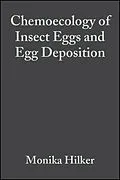This is the first book focusing on the chemoecology of insect eggs and egg deposition. It covers a wide range of different issues including herbivorous and carnivorous insects, social insects and those of medical and veterinary importance. The knowledge compiled in this book may promote future studies on evolutionary aspects on insect reproductive behaviour as well as on controlling insect pests by targeting the egg stage.
Autorentext
Monika Hilker is a biologist and a professor at the Freie Universität Berlin. She leads the Applied Zoology/Animal Ecology working group at the Freie Universität, studying the chemical and molecular ecology of plant-insect interactions.
Torsten Meiners is the author of Chemoecology of Insect Eggs and Egg Deposition, published by Wiley.
Klappentext
The fascinating research field of chemoecology of insects mainly considers larval and adult states, while insect eggs have been somewhat neglected up to now. However, as immobile stages the eggs are highly vulnerable and need to cope with numerous problems such as predation, parasitisation, pathogen infection and plant and host defences. How do they face these dangers?
Insects have been shown to endow their eggs with various naturally occurring chemicals that deter or poison enemies. These chemicals may be produced either by the insects themselves or their endosymbionts, ort they may be obtained from host only on the protective power of the eggs themselves, but also on the site where they have been laid. The ovipositing female is known to be informed by numerous infochemicals about the suitability of sites for egg deposition and development.
This is the first book focusing on the chemoecology of insect eggs and egg deposition. The much-needed synthesis of a broad array of facets of this topic includes molecular, chemical, physiological, morphological, ecological and evolutionary aspects. A wide range of different insects is addressed: herbivorous and carnivorous insects, social insects, and those of medical and veterinary importance. The knowledge compiled in this book may promote future studies on evolutionary aspects of insect reproductive behaviour as well as on controlling insect pests by targeting the egg stage. Thus it may provide important information for researchers interested in both fundamental and applied research, as well as also for readers who are just fascinated by the multiple facets of the chemoecology of insects.
Inhalt
List of Contributors.
Acknowledgements.
Chemoecology of Insect Eggs and Egg Deposition: An Introduction (Monika Hilker and Torsten Meiners).
Chemoecology of Insect Eggs.
Novel Morphological and Physiological Aspects of Insect Eggs (Ioannis P. Trougakos and Lukas H. Margaritis).
Insect Accessory Reproductive Glands: Key Players in Production and Protection of Eggs (Cedric Gillott).
Chemical Protection of Insect Eggs (Murray S. Blum and Monika Hilker).
Paternal Investment in Egg Defence (Thomas Eisner, Carmen Rossini, Andres Gonzalez, Vikram K. Iyengar, Melody V. S. Siegler and Scott R. Smedley).
Brood Protection in Social Insects (Manfred Ayasse and Robert J. Paxton).
The Role of Microorganisms for Eggs and Progeny (Rupert L. L. Kellner).
Chemoecology of Egg Deposition.
Plant Chemical Cues Important for Egg Deposition by Herbivorous Insec6ts (Erich Stadler).
The Plant's Response towards Egg Deposition (Monika Hilker, Odette Rohfritsch and Torsten Meiners).
Oviposition Pheromones in Herbivorous and Carnivorous Insects (Peter Anderson).
Chemoecology of Oviposition in Insects of Medical and Veterinary Importance (Philip J. McCall).
Chemoecology of Parasitoid and Predator Oviposition Behaviour (Johannes L. M. Steidle and Joop J. A. van Loon).
Evolutionary Ecology of Oviposition Marking Pheromones (Thomad S. Hoffmeister and Bernard D. Roitberg.
Evolutionary Ecology of Oviposition Strategies (Niklas Janz).
Subject Index.
Taxonomic Index
